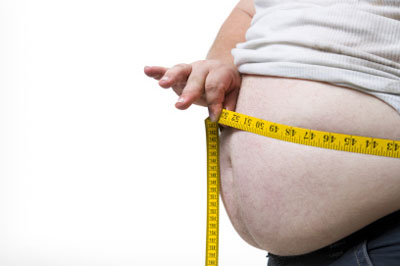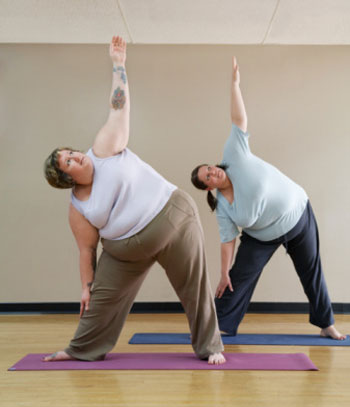-


-

- FIGHT THE FLABLIFESTYLE ADVISORY
-
Obesity is an excess accumulation of body fat, particularly intra-abdominal fat, that is associated with increased health risks e.g. hypertension, coronary artery disease, type 2 diabetes, gall bladder disease, respiratory disease, arthritis. Body fat is stored in different regions of the body. Central or android- type obesity is associated with an increased risk of Coronary Artery Disease. Peripheral or gynoid obesity, where there is weight gain in the thighs and hips does not have the same magnitude of risk.
According to the American College of Sports Medicine, objective evidence of obesity are:- BMI greater than 30 kg/m²
- Waist circumference, men greater than 102 cm and women- greater than 88 cm
- Body fat percentage, men- greater than 25% and women- greater than 32%
BENEFITS
Quality of life improves because of:- Decreased shortness of breath
- Increased mobility and range of movement
- Increased capacity for exercise and activity
- Decreased ankle swelling
- Increase in the level of physical self-efficacy (i.e. one’s perception of their ability to exercise)
- Increased agility and balance

CAUTION
Before beginning an exercise program, the individual should have a detailed medical evaluation and undergo diagnostic investigations as appropriate. A graded exercise test (stress test) may be helpful if the client is above 40 years and also has one or more of the coronary artery disease risk factors.
-
EXERCISE RECOMMENDATION
Cardio or aerobic exercise should be low to moderate intensity. ACSM recommends that adults participate in at least 150 min/week of moderate-intensity physical activity to prevent significant weight gain. However, for greater weight loss and enhanced prevention of weight gain, a physical activity of approximate 250 to 300 min/week of moderate intensity physical activity might be useful.
Weight training exercise regimen should include less weights and more repetition. Resistance training increases fat free mass (lean mass) which may contribute to weight loss.

TIPS
- Caloric restricted diet is recommended, but only under the supervision of a physician or a qualified dietician
- Small frequent meals are recommended
- Drink plenty of water
- Initially go slow in the exercise sessions. Do not suddenly increase the intensity